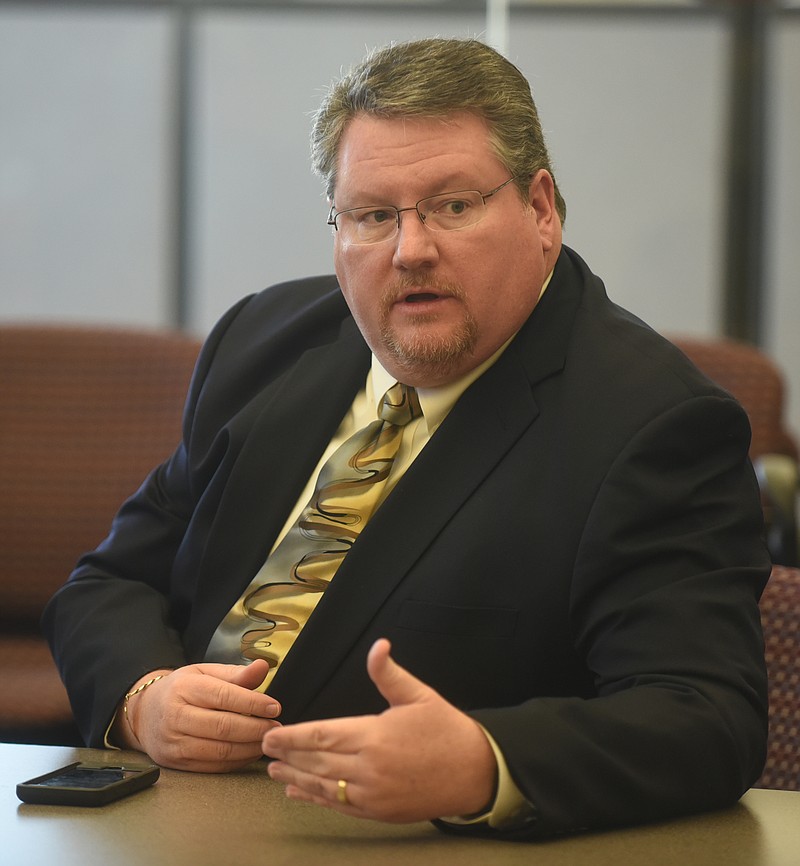NASHVILLE - Lawmakers from Hamilton County are moving a bill aimed at preventing the county's Water and Wastewater Treatment Authority from using third parties to recover customers' unpaid bills and penalties.
Rep. Marc Gravitt, R-East Ridge, the House sponsor, said the bill was sparked by complaints when WWTA tried to collect from landlords or sometimes from new tenants after the former renter didn't pay the bill.
The bill passed the House Business and Utilities Committee last week and now goes to Calendar and Rules, the last committee hurdle before it would go to the House floor.
State law allows water and wastewater authorities to hit up property owners for unpaid bills. The legislation would block that for third-party property owners like apartment complexes.
Gravitt said under the bill, such utility officials "cannot go back and charge the disinterested third party who was not part of the agreement, such as a future tenant or landlord."
The bill also authorizes a water or wastewater authority to require a deposit from a party to the contract or agreement based on past usage and payment history. Gravitt said that is intended to help WWTA collect charges or penalties.
The legislation represents the latest challenge for WWTA, which provides sewer services in unincorporated areas of Hamilton County, as well as East Ridge, Lakesite, Lookout Mountain, Red Bank, Ridgeside, Signal Mountain and Soddy-Daisy.
WWTA has struggled to collect customer payments and penalties since 2013, when investor-owned Tennessee American Water stopped including WWTA sewer fees on the water company's monthly bills.
Cleveland Grimes, WWTA's executive director, declined to comment Friday.
But WWTA officials have previously complained of collection problems, especially from customers living in apartments.
Local lawmakers thought some issues were resolved in 2014 after Tennessee American agreed to more closely cooperate with WWTA on shutting off water service when customers didn't pay sewer bills. The water company acted after lawmakers threatened to pass a bill requiring it to resume billing for WWTA.
The situation is unique to Hamilton County, where much of the water service is provided by a private utility while sewer service is handled by local governments or government- created entities.
Gravitt said Tennessee American has cooperated by providing lists of new water customers and by turning off water service for nonpayment of sewer bills.
But he said Tennessee American doesn't require its customers to provide certain types of personal information, which the sewer authority says makes it harder to ensure it's dealing with the actual nonpayer.
That's led WWTA to go after property owners, including apartment complexes, which the law now allows it to do and the bill would halt. In other cases, WWTA has sought to collect from new tenants on prior tenants' bills. While that practice is said to have been halted, efforts to confirm that last week with Grimes were unsuccessful.
These attempts to go after property owners have drawn concerns from apartment or duplex owners, especially in East Ridge and Red Bank, those involved in discussions say.
Gravitt, who also is East Ridge vice mayor, recently met with officials from Hamilton County government, WWTA, Tennessee American and representatives of apartment and Realtor associations.
House Majority Leader Gerald McCormick, R-Chattanooga, is a bill co-sponsor. Senate Speaker Pro Tem Bo Watson, R-Hixson, is handling the companion bill, which is scheduled to come up in committee this week.
Gravitt said he hopes Tennessee American and WWTA work out an agreement.
"The main issue is we have a government entity and a privately owned company. So there needs to be some kind of an arrangement between the two," he said. " I don't think it's fair that we get involved and force a privately owned company to facilitate and help a government entity. What I would like to do is encourage both sides and reach some kind of an amicable agreement."
Daphne Kirksey, Tennessee American's external affairs manager, said Friday the company is willing to work with WWTA.
"But," Kirksey added, "we want to make sure that it's not at a cost to our customers. We don't want any solution that would lead us to have to go into a general rate case" in front of the Tennessee Regulatory Authority.
Presently, customers wanting water service contact Tennessee American and establish service. Kirksey said WWTA would like the water company to refer customers first to the sewer authority, which could collect a service deposit before Tennessee American turns on the water.
"Right now our system just doesn't allow that," Kirksey said. "It would not be able to distinguish who are the WWTA customers."
Tennessee American also serves the city of Chattanooga, which operates the separate Moccasin Bend Wastewater Treatment Plant, and other communities that aren't part of WWTA's system.
"It would require basically an IT software upgrade cost startup and then there would have to be some additional work done by new hires to manage that," Kirksey said.
That would require approval by the Tennessee Regulatory Authority, as it wouldn't fall under a simplified rate mechanism pushed through in 2013 for certain types of rate increases.
Haslam acted after a number of monopoly utilities, including Tennessee American, complained that general rate cases had become too expensive as Chattanooga, the Tennessee Attorney General's consumer advocacy division and groups like the Chattanooga Regional Manufacturers Association intervened and fiercely contested proposed rate hikes.
Contact Andy Sher at asher@timesfree press.com, 615-255-0550 or follow via twitter at AndySher1.
